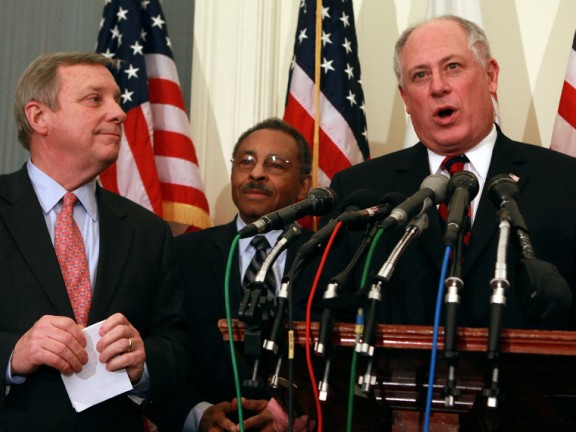Expediency Overcomes Sustainability in Illinois, New Jersey

Illinois and New Jersey are showing us how you should never, ever underestimate politicians' willingness to put off painful fiscal decisions. Not just until tomorrow, but to the next generation, when descendants of today's leaders and taxpayers will be left struggling with bills they probably won't be able to afford.
Just before it adjourned last week, the Illinois Legislature passed a $35.7 billion budget for fiscal 2015 that contains the kind of tricks that have helped Moody's Investors Service, Standard & Poor's and Fitch Ratings award the Land of Lincoln the lowest bond rating of any U.S. state. According to the Chicago Tribune and Chicago Sun-Times, the spending plan sent to Democratic Governor Pat Quinn includes such gimmicks as tapping special funds for daily operations and betting on $200 million in future revenue that the state may - or may not - ever collect.
"We are kicking the can down the road," state Sen. Heather Steans, a Chicago Democrat and a lead budget negotiator, told the Sun-Times. The budget, Quinn complained in a tweet, "postpones the tough decisions."
Before the House approved the legislation, Speaker Michael Madigan rejected a bid by Quinn to extend the state's 2011 temporary income-tax increase, creating a $1 billion budget deficit for next year. The Tribune tallied up the ways legislators found the cash to balance the books:
The newspaper estimated that the budget includes about $650 million that had been going to pay down $4.2 billion in overdue vendor bills, while $650 million more would be borrowed from funds set aside for specific special purposes. Another $380 million would come from delaying payments for workers' health insurance. So while the budget is now in balance, at least in a cash-accounting sense, no one really knows how the state will finance education, Medicaid, pensions and billions of dollars of long-overdue vendor bills in 2016, when the full impact of the tax-hike expiration is felt.
While it's an election year, with Quinn facing a tough challenge from Republican businessman Bruce Rauner, it's a shame that Illinois is refusing to face its obligations squarely. Interest on unpaid bills alone cost taxpayers $318 million last year, enough to finance the entire State Police budget. And then there's the pension mess. Bloomberg News estimates the state had $100.5 billion in unfunded liabilities to current and future retirees as of 2013. To be sure, legislators last year passed what's been billed as a 30-year pension fix worth $145 billion. But even though the governor has almost a month to tinker with the legislature's budget, last week's final-hours maneuvering gives me little hope for lawmakers' long-term commitment to their retirement-funding deal.
Said Rauner: "The politicians in charge of Springfield again refused to make the structural reforms needed to fix state government. Instead, they passed the same type of broken, dishonest budget that career politicians in Illinois have been passing for years."
The last-minute gimmickry in Illinois has its equal in New Jersey, where Republican Governor Chris Christie recently backtracked on a long-term pension-funding deal struck with the Democratic-controlled Legislature. Christie's excuse was a shortfall in his administration's revenue forecasts, the third in as many years.
So, facing a $1 billion deficit in the year ending June 30 and another $1.6 billion gap for fiscal 2015, the governor is slashing his contribution to the state pension to about $1.4 billion, rather than the $3.8 billion he'd promised. The move will swell the retirement system's deficit to $40 billion by 2016, Treasurer Andrew Sidamon-Eristoff testified to lawmakers.
Resorting to one-time fixes means politicians are avoiding fundamental questions about balancing taxation, investment in infrastructure and education, and society's need to keep promises they've made to creditors, be they bondholders, vendors or workers who were assured they could count on their states for financial security in retirement.
Richard Ravitch, the former New York lieutenant governor who co-chaired the State Budget Crisis Task Force with Volcker Alliance Chairman Paul A. Volcker, wrote in the Wall Street Journal recently that many states are engaging in "harmful service cuts and a failure to fund promises made to creditors, public employees and the beneficiaries of essential public services, including elderly people without minimal levels of financial support." As they approach their new fiscal year, Illinois and New Jersey are showing why their expedient budget techniques are not sustainable.
